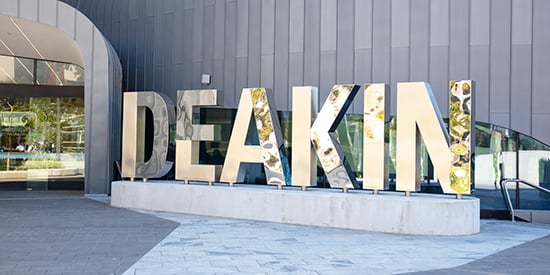#1 university careers service in Australia^
Taught by leaders in their field
Connect with 60,000+ online students
Key facts
Duration
Trimester 1: 1 year part-time
Trimester 2: 1 year part-time
Key dates
Direct applications to Deakin for Trimester 2 2024 close 23 June 2024
Current Deakin Students
To access your official course details for the year you started your degree, please visit the handbook
Course overview
Studying the Graduate Certificate of Criminology gives you a solid base of knowledge in crime and criminal justice. Begin to approach criminal behaviour, crime policy and prevention from a different angle, applying your learnings to further study or directly in the workforce.
Are you ready to start building your own network of industry connections?
Deakin's postgraduate criminology courses are designed with input from a variety of industry partners and relevant stakeholders including police, policy and regulatory agencies so you can be confident that the skills you develop studying Deakin's Graduate Certificate of Criminology will be relevant to your future or existing career.
You'll push the boundaries of the way we currently look at justice and creatively examine areas of ongoing and emerging criminological concern. Get ready to engage and debate pressing issues of local, national and global concern.
Your core subjects will focus on crime and innovative justice and criminological policy and criminal justice practice. You can also choose elective units, allowing you to create a degree built for your unique career goals. Your elective unit options include:
- Critical Criminology Theory
- Public Criminology and Criminological Knowledge
- Challenges to Democratic Governance
- Human Rights in World Politics
While the course is conveniently offered on our premium online learning platform, there are also opportunities to engage in practical learning. During the course, you can utilise Deakin's cutting-edge immersive learning environments to experience lively and engaging content.
Read MoreCourse information
- Award granted
- Graduate Certificate of Criminology
- Year
2024 course information
- Deakin code
- A504
- Level
- Postgraduate (Graduate Certificate and Graduate Diploma)
- Australian Qualifications Framework (AQF) recognition
The award conferred upon completion is recognised in the Australian Qualifications Framework at Level 8
Course structure
To qualify for the Graduate Certificate of Criminology, a student must successfully complete 4 credit points of study comprising two credit points of core units and two credit points of course electives.
2
Core units
2
Elective units
4
Total units
Core Units
Intakes by location
The availability of a course varies across locations and intakes. This means that a course offered in Trimester 1 may not be offered in the same location for Trimester 2 or 3. Check each intake for up-to-date information on when and where you can commence your studies.
Trimester 1 - March
- Start date: March
- Available at:
- Online
- Burwood (Melbourne)
Trimester 2 - July
- Start date: July
- Available at:
- Online
- Burwood (Melbourne)
Additional course information
Course duration
Course duration may be affected by delays in completing course requirements, such as accessing or completing work placements.
Participation requirements
Reasonable adjustments to participation and other course requirements will be made for students with a disability. More information available at Disability support services.
Entry requirements
Selection is based on a holistic consideration of your academic merit, work experience, likelihood of success, availability of places, participation requirements, regulatory requirements, and individual circumstances. You will need to meet the minimum academic and English language proficiency requirements to be considered for selection, but this does not guarantee admission.
Academic requirements
To be considered for admission to this degree you will need to meet at least one of the following criteria:
- completion of a bachelor degree or higher
- at least two years' relevant work experience (or part-time equivalent)
English language proficiency requirements
To meet the English language proficiency requirements of this course, you will need to demonstrate at least one of the following:
- bachelor degree from a recognised English-speaking country
- IELTS overall score of 6.5 (with no band score less than 6.0) or equivalent
- other evidence of English language proficiency (learn more about other ways to satisfy the requirements)
Admissions information
Learn more about Deakin courses and how we compare to other universities when it comes to the quality of our teaching and learning.
Not sure if you can get into Deakin postgraduate study? Postgraduate study doesn’t have to be a balancing act; we provide flexible course entry and exit options based on your desired career outcomes and the time you are able to commit to your study.
Recognition of prior learning
The University aims to provide students with as much credit as possible for approved prior study or informal learning which exceeds the normal entrance requirements for the course and is within the constraints of the course regulations. Students are required to complete a minimum of one-third of the course at Deakin University, or four credit points, whichever is the greater. In the case of certificates, including graduate certificates, a minimum of two credit points within the course must be completed at Deakin.
You can also refer to the Recognition of prior learning system which outlines the credit that may be granted towards a Deakin University degree and how to apply for credit.
Fees and scholarships
Fee information
Learn more about fees and your options for paying.
The available fee places for this course are detailed above. Not all courses at Deakin have Commonwealth supported places available.
The 'Estimated tuition fee' is provided as a guide only based on a typical enrolment of students completing this course within the same year as they started. The cost will vary depending on the units you choose, your study load, the length of your course and any approved Recognition of prior learning.
One year full-time study load is typically represented by four credit points of study for Graduate Certificates. Each unit you enrol in has a credit point value. The 'Estimated tuition fee' is calculated by adding together four credit points of a typical combination of units for your course.
You can find the credit point value of each unit under the Unit Description by searching for the unit in the Handbook.
Learn more about fees and available payment options.
FEE-HELP calculator
What is FEE-HELP?
FEE-HELP loans cover up to 100% of tuition fees for eligible students. By taking out a FEE-HELP loan, the government pays your tuition fees directly to Deakin, and the balance is repaid from your employment income - but only once you're earning over $51,550.
Please note: fees shown by the calculator are indicative only and based on 2024 rates. Actual fees may vary. We advise confirming fees with Prospective Student Enquiries prior to enrolment.
Estimate your FEE-HELP
FEE-HELP payments
per pay cycle
Take-home pay
after FEE-HELP and tax
per pay cycle
Your estimated FEE-HELP repayments
- $* is the estimated full cost for a Graduate Certificate of Criminology (4 credit points), based on the 2024 fees.
- is the annual FEE-HELP payment, based on your current salary
- of your current salary be spent on FEE-HELP
*Disclaimer
Deakin University (Deakin):
- gives no warranty and accepts no responsibility for the currency, accuracy or the completeness of the information provided;
- advises users that no reliance should be placed upon on the information provided, and;
- instructs users that they should confirm the actual course fee with Prospective Student Enquiries prior to enrolment.
This tool provides indicative information about the fees that will be payable in respect of courses and subjects offered to prospective students domiciled in Australia during the periods indicated.
Please note that the fees shown by the calculator are indicative only and actual fees may vary. Users are advised to confirm the actual course fee with Prospective Student Enquiries prior to enrolment.
The estimated course fee is based on the tuition fee costs applicable to a domestic full time student commencing the course in Trimester 1 and studying full time for the duration of the course but:
- does not include non-tuition costs that may apply, such as Student Services and Amenities Fees (SSAF);
- does not take into account any scholarships or bursaries awarded to the student (including the 10% Deakin alumni discount);
- assumes the maximum number of units that need to be successfully completed actual number completed may be reduced if recognition of prior learning is granted;
- assumes that no exceptional, or non-typical, circumstances apply to the proposed course of study;
- assumes that the options that the user selects are appropriate for the course of study that they intend to undertake;
- where fees are estimated for future years those fee will be subject to annual increases in accordance with increases in the cost of course delivery.
Scholarship options
A Deakin scholarship might change your life. If you've got something special to offer Deakin – or you just need the financial help to get you here – we may have a scholarship opportunity for you.
Postgraduate bursary
If you’re a Deakin alumnus commencing a postgraduate award course, you may be eligible to receive a 10% reduction per unit on your enrolment fees.
Apply now
Some of our courses have limited places available - for the latest on courses still open for application, visit Courses by trimester.
Create an account in the Deakin Application Portal, start your application, enter personal details, education experience, upload supporting documents and submit. Need help? Play this video, or contact one of our friendly future student advisers on 1800 693 888 or submit an online enquiry.
For more information on the application process and closing dates, see the How to apply webpage. If you're still having problems, please contact us for assistance.
Entry pathways
Students who successfully complete this course would meet the entry requirements and therefore be eligible to apply for admission into the A704 Master of Criminology (or similar).
Contact information
Our friendly advisers are available to speak to you one-on-one about your study options, support services and how we can help you further your career.
- Call us: 1800 693 888 Mon–Fri, 9am–5pm
- Live Chat: Mon–Thurs, 8am–7pm, Fri 8am–5pm
- Submit an online enquiry
- Help hub find common and trending questions and answers
Careers
Career outcomes
As a graduate, your deeper understanding of crime and criminal justice will be in high demand by agencies focused on specific areas of the community. If you're already in the workforce, you'll be prepared for roles that require advanced knowledge, ensuring you're capable of making well-rounded decisions that will positively impact lives.
Once successfully completing this course, you'll also be eligible to apply for the Master of Criminology - a further step in the right direction to becoming a senior criminological expert.
With a Graduate Certificate of Criminology, you can confidently apply for roles as a corrections officer, case manager/worker or specialist adviser and explore a variety of areas, including:
- anti-corruption agencies
- correctional facilities and prisons
- community services
- criminology research
- government agencies
- intelligence and security services
- sociology and youth work
- state and federal police
For more information go to DeakinTALENT
Course learning outcomes
Deakin's graduate learning outcomes describe the knowledge and capabilities graduates can demonstrate at the completion of their course. These outcomes mean that regardless of the Deakin course you undertake, you can rest assured your degree will teach you the skills and professional attributes that employers value. They'll set you up to learn and work effectively in the future.
| Deakin Graduate Learning Outcomes | Course Learning Outcomes |
| Discipline-specific knowledge and capabilities | Use advanced and integrated knowledge of criminological scholarship to review and analyse key issues in the definitions, history, causes, harms and prevention of different types of crime and criminal behaviour within Australia and internationally |
| Communication | Communicate the findings and analyses of criminological theories, concepts and their application to real-world contexts, in a broad range of written, oral and digital formats, to different audiences associated with or engaged in criminological activities |
| Digital literacy | Employ a broad range of digital technologies to communicate types and forms of crime and appropriate prevention responses to a diverse range of audiences, including the public and individuals and groups associated with or engaged in criminal justice policy and practice |
| Critical thinking | Exercise independent and critical judgement to organise, synthesise and evaluate complex theoretical approaches to defining and explaining crime and criminal behaviour in order to make recommendations to improve current policies and practices that address crime and criminal behaviour |
| Problem solving | Analyse differing perspectives and approaches to preventing and responding to crime and criminal behaviour in a variety of contexts and employ creative problem solving skills to investigate complex problems in a systematic manner as well as to generate creative, contextually aware solutions to those problems |
| Teamwork | Collaborate productively in teams to research and evaluate explanations for and responses to complex issues in crime and criminal behaviour in a variety of national and international contexts |
| Global citizenship | Analyse and respond to criminological issues, in domestic, regional and international contexts, as a reflective scholar and practitioner, taking into account cultural and socio-economic diversity, social and environmental responsibility and adherence to professional and ethical standards in a variety of contexts |
| Approved by Faculty Board March 2020 | |
Events Explore more events
Footnotes
^Australian Graduate Recruitment Industry Awards, 2017, 2018, 2019 winner




